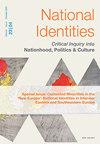What has nation building got to do with immigration?
IF 0.7
Q3 POLITICAL SCIENCE
引用次数: 0
Abstract
ABSTRACTThe perception of immigrants varies across countries. In Botswana, xenophobia is rarely violent and manifests in stereotypes the host population has about immigrants. In South Africa, anti-immigrant violence has claimed many lives. However, South Africa's nation-building process has facilitated the co-existence of people from different backgrounds and races under an inclusive national identity. In contrast, Botswana's nation-building process assimilated different ethnic groups under the BatswanaFootnote1 identity, hence fostering an ethno-national identity, which is exclusivist. This study draws N=2,390 and N=1,200 South African and Batswana respondents from Afrobarometer, respectively, and finds that Batswana who identify with national identity are likely to have negative attitudes towards immigrants. Conversely, South Africans identifying with national identity are likely to have positive attitudes toward immigrants. Still, South Africans who endorse ethnic identity are likely to have negative attitudes towards immigrants. This study has larger implications for policies promoting pluralistic national identity. Curricula inculcating pluralism can be introduced in citizenship-building programs..KEYWORDS: Immigrantsnation buildingnational identitySouth AfricaBotswana Disclosure statementNo potential conflict of interest was reported by the author(s).Notes1 Batswana (Tswana) is a plural of Motswana, which is how citizens of Botswana identify themselves. In terms of ethnic identity, there are Batswana (Tswana) and non-Batswana ethnic group who belong to other ethnic groups in Botswana.2 Coloureds are the mixed-raced population of South Africa. This is one of the race categories in South Africa. This should not be confused with the racially charged pejorative term ‘colored’ in the context of the United States.3 SA stands for South Africa.4 BW is Botswana’s country code.Additional informationNotes on contributorsWilliam HatungimanaWilliam Hatungimana is a visiting assistant professor at Oklahoma State University. His research focuses on Immigration and African Politics.国家建设和移民有什么关系?
摘要各国对移民的看法各不相同。在博茨瓦纳,仇外心理很少是暴力的,表现为东道国人民对移民的刻板印象。在南非,反移民暴力夺去了许多人的生命。然而,南非的国家建设进程促进了不同背景和种族的人在包容性的国家认同下共存。相比之下,博茨瓦纳的国家建设过程在batswanafoot注1的身份下同化了不同的民族群体,从而形成了一种排他性的种族-国家身份。本研究分别从非洲晴雨表(Afrobarometer)抽取了N= 2390名南非受访者和N= 1200名巴茨瓦纳受访者,发现认同国家认同的巴茨瓦纳人很可能对移民持负面态度。相反,认同国家身份的南非人可能对移民持积极态度。尽管如此,支持种族认同的南非人可能对移民持负面态度。这项研究对促进多元民族认同的政策具有更大的意义。关键词:移民建设;国家认同;南非;博茨瓦纳;披露声明作者未报告潜在的利益冲突。注1 Batswana(茨瓦纳)是Motswana的复数形式,这是博茨瓦纳公民的自我标识。在民族认同方面,有属于博茨瓦纳其他民族的巴茨瓦纳族和非巴茨瓦纳族。2有色人种是南非的混血儿。这是南非的种族分类之一。在美国,这个词不应与带有种族歧视色彩的“有色人种”混淆,3 SA代表南非,4 BW是博茨瓦纳的国家代码。作者简介:william Hatungimana是俄克拉荷马州立大学的客座助理教授。他的研究重点是移民和非洲政治。
本文章由计算机程序翻译,如有差异,请以英文原文为准。
求助全文
约1分钟内获得全文
求助全文
来源期刊

NATIONAL IDENTITIES
POLITICAL SCIENCE-
CiteScore
1.70
自引率
0.00%
发文量
37
期刊介绍:
National Identities explores the formation and expression of national identity from antiquity to the present day. It examines the role in forging identity of cultural (language, architecture, music, gender, religion, the media, sport, encounters with "the other" etc.) and political (state forms, wars, boundaries) factors, by examining how these have been shaped and changed over time. The historical significance of "nation"in political and cultural terms is considered in relationship to other important and in some cases countervailing forms of identity such as religion, region, tribe or class. The focus is on identity, rather than on contingent political forms that may express it. The journal is not prescriptive or proscriptive in its approach.
 求助内容:
求助内容: 应助结果提醒方式:
应助结果提醒方式:


